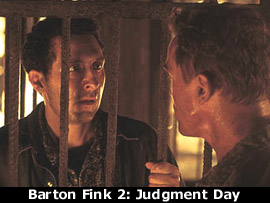40 Days and 40 Nights (2002)
**½/****
starring Josh Hartnett, Shannyn Sossamon, Monet Mazur, Maggie Gyllenhaal
screenplay by Rob Perez
directed by Michael Lehmann
by Walter Chaw Matt (Josh Hartnett) is an oversexed young man in a sanitized San Francisco who, after suffering a tough split from man-eater Nicole (Vinessa Shaw), decides to follow his brother John (Adam Trese), an apprentice in the seminary, in the walk of celibacy. He gives up sex for Lent in all its myriad forms (neglecting, dishonestly, orchid-alingus in the film’s dumbest bit of “Penthouse Forum” erotica), and spawns an Internet culture of schadenfreudens waiting for Matt to fall off the wagon and into the hay. During that period, can it be any wonder that Matt meets Erica (Shannyn Sossamon), the girl of his dreams, in a Hopper-esque laundromat?

 by Walter Chaw
by Walter Chaw